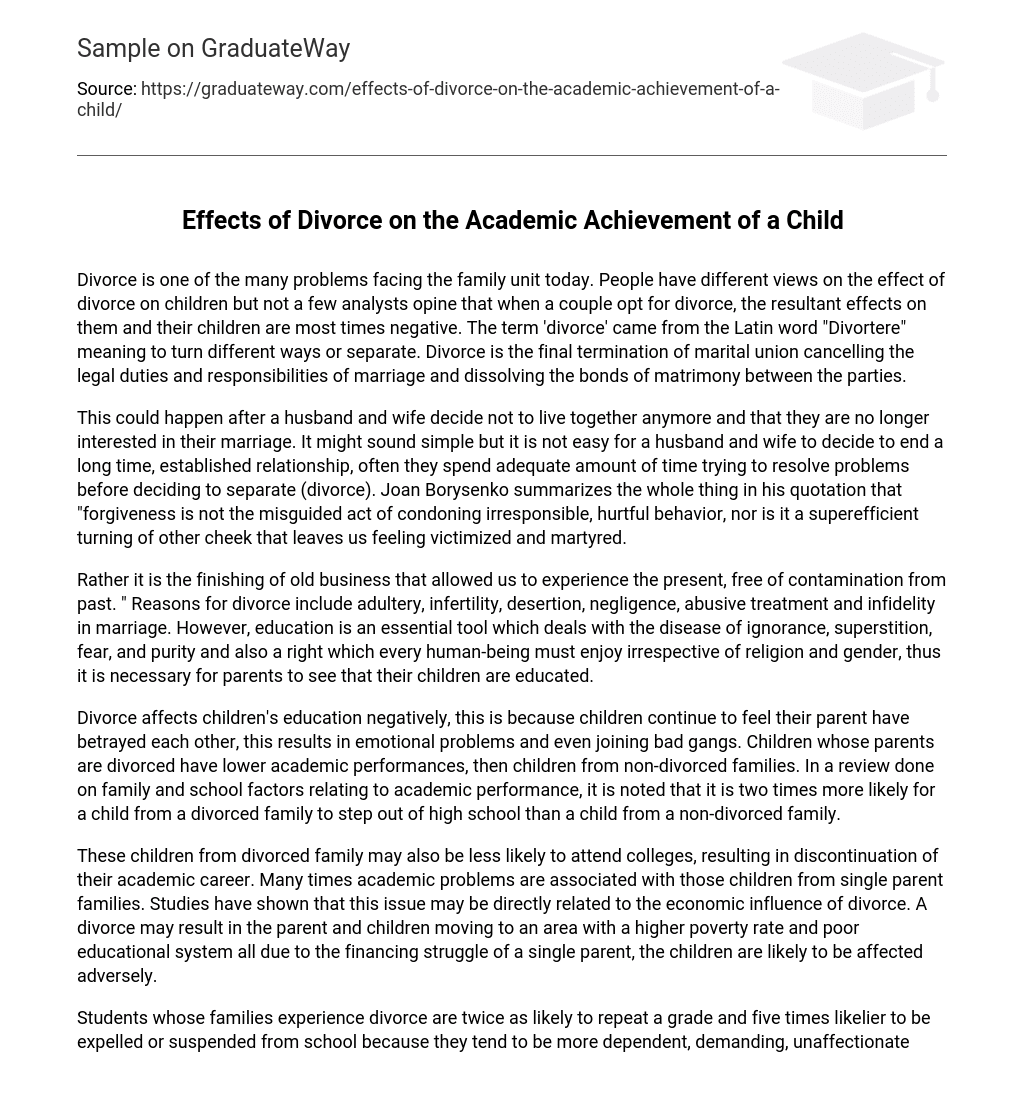Divorce is one of the many problems facing the family unit today. People have different views on the effect of divorce on children but not a few analysts opine that when a couple opt for divorce, the resultant effects on them and their children are most times negative. The term ‘divorce’ came from the Latin word “Divortere” meaning to turn different ways or separate. Divorce is the final termination of marital union cancelling the legal duties and responsibilities of marriage and dissolving the bonds of matrimony between the parties.
This could happen after a husband and wife decide not to live together anymore and that they are no longer interested in their marriage. It might sound simple but it is not easy for a husband and wife to decide to end a long time, established relationship, often they spend adequate amount of time trying to resolve problems before deciding to separate (divorce). Joan Borysenko summarizes the whole thing in his quotation that “forgiveness is not the misguided act of condoning irresponsible, hurtful behavior, nor is it a superefficient turning of other cheek that leaves us feeling victimized and martyred.
Rather it is the finishing of old business that allowed us to experience the present, free of contamination from past. ” Reasons for divorce include adultery, infertility, desertion, negligence, abusive treatment and infidelity in marriage. However, education is an essential tool which deals with the disease of ignorance, superstition, fear, and purity and also a right which every human-being must enjoy irrespective of religion and gender, thus it is necessary for parents to see that their children are educated.
Divorce affects children’s education negatively, this is because children continue to feel their parent have betrayed each other, this results in emotional problems and even joining bad gangs. Children whose parents are divorced have lower academic performances, then children from non-divorced families. In a review done on family and school factors relating to academic performance, it is noted that it is two times more likely for a child from a divorced family to step out of high school than a child from a non-divorced family.
These children from divorced family may also be less likely to attend colleges, resulting in discontinuation of their academic career. Many times academic problems are associated with those children from single parent families. Studies have shown that this issue may be directly related to the economic influence of divorce. A divorce may result in the parent and children moving to an area with a higher poverty rate and poor educational system all due to the financing struggle of a single parent, the children are likely to be affected adversely.
Students whose families experience divorce are twice as likely to repeat a grade and five times likelier to be expelled or suspended from school because they tend to be more dependent, demanding, unaffectionate and disobedient, than students from intact families. That is, students from divorce families are more afraid of abandonment, loss of love and bodily harm, they carry these problems to school. And also divorced students were more likely to abuse drugs, to commit violent acts, to take their own life and to bear children out of wed-luck. Commenting on the issue, Mrs.
Maryam Mohammed Madam, a Sociologist, in the Department of General Studies, Federal Polytechnic Bida said, divorce has negative effects on children’s education, as the children first and foremost come under a single parent, “this has physical, emotional, cognitive, moral and educational effects on the children, the single parent no longer has adequate time for the children and they fall victim of many antisocial behaviors from peer groups, like imitation of bad characters from friends smoking, illegal sex, teenage pregnancy and other immoral behaviors.
Intact family creates more flexible and conducive environment for learning and high educational motivation to their children, when compared to divorced parents. Although children control in a divorce family is determined by sex, age and number of children in the family, females are generally more flexible to control than their male counter parts, and some male children don’t even care about their divorce parents but rather see it as an opportunity to engage in antisocial behaviors. The sociologist advises that to curb the effect of divorce on children, “the parent should manage his or her time adequately, know the children’s emotional feelings and also visit their schools regularly to ascertain their activities, it is important to also know if a child is in the system or has been withdrawn. ” In essence parental divorce diminishes the economic and social resources available to children which in turn has negative consequences for the children’s educational attainment.
Thus parents should try to avoid any negative impact of divorce on their children by ensuring corrective measures are clearly stipulated based on the kind of problem, they should try to avoid divorce as much as possible, and be patient so that their children can attain their desired educational level without interruption. Gimba Abdullah Liman wrote from the Department of Mass Communication, Federal Polytechnic Bida, Niger State. Nigeria





